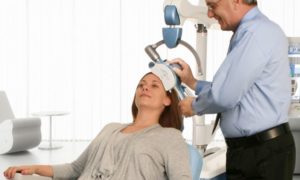TMS Therapy for Depression: How Does It Work?
 TMS therapy, or transcranial magnetic stimulation, is becoming increasingly popular as a treatment for depression. The therapy uses magnetic pulses to stimulate and alter the activity in certain areas of the brain that are thought to be involved in mood regulation. The hope is that these changes will result in an improvement in the symptoms of depression. Our website provides info about tms therapy near me.
TMS therapy, or transcranial magnetic stimulation, is becoming increasingly popular as a treatment for depression. The therapy uses magnetic pulses to stimulate and alter the activity in certain areas of the brain that are thought to be involved in mood regulation. The hope is that these changes will result in an improvement in the symptoms of depression. Our website provides info about tms therapy near me.
To understand how TMS therapy works, it’s important to first understand a bit about the brain. The brain is divided into various regions, each of which plays a role in various mental processes. The areas of the brain involved in mood regulation are the dorsolateral prefrontal cortex, the anterior cingulate cortex, and the limbic structures. When these areas are functioning properly, a person’s mood is balanced and they experience positive emotions. However, when these areas become underactive, the person may experience feelings of sadness, anxiety, and depression.
TMS therapy targets these areas of the brain with magnetic pulses, causing a change in brain activity. The magnetic pulses stimulate the neurons in the targeted areas, which leads to an increase in the release of neurotransmitters such as serotonin and dopamine. These neurotransmitters interact with other neurons and can help regulate mood.
The TMS therapy procedure itself is fairly simple. It is typically performed in a specialized office setting. The patient sits in a chair and wears a special helmet that contains an array of magnets. The magnets produce an electromagnetic field that is directed at specific areas of the brain.
The patient may experience a slight tapping sensation or mild discomfort during the procedure. It generally lasts between 30-45 minutes and is usually performed daily for four to six weeks. The patient may experience some side effects such as headaches or scalp discomfort, but these usually go away within a few days.
So far, the results of TMS therapy for depression have been promising. Studies have shown that TMS can reduce symptoms of depression significantly. In addition, the effects of TMS may last longer than those of antidepressant medications. It is important to keep in mind, however, that TMS is not a cure for depression. It is meant to be used as an adjunct treatment along with psychotherapy and/or medication.
TMS therapy is a relatively new treatment for depression, and more research is needed to determine its long-term effectiveness. In the meantime, it appears to be a promising treatment option for those who are not responding to other treatments or who cannot tolerate the side effects of medications. If you are considering TMS therapy for your depression, it is important to talk to your doctor or mental health professional to discuss the potential benefits and risks
CONTACT INFO
Khaled Bowarshi
M.D. | Depression Psychiatrist
26843 Tanic Drive
STE 101 Wesley Chapel
FL 33544
(813) 867-2378